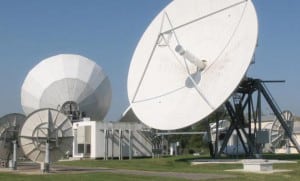Telesat CEO Questions Role of North American and European Export Credit Agencies
[Via Satellite 09-09-2014] CEOs from the “Big Four” Fixed Satellite Services (FSS) operators engaged in a lively debate about the future of the satellite industry in a panel that also included Evert Dudok, president of communication, intelligence and security at Airbus Defence and Space. This was one of the highlights of day two of Euroconsult’s World Satellite Business Week (WSBW). The panel touted a number of interesting perspectives, including Telesat CEO Dan Goldberg questioning in strong terms the role of Export Credit Agencies (ECAs) in North America and Europe getting involved in the commercial satellite industry. In a somewhat surprising blast, Goldberg said, “There is no reason why we need governments underwriting satellite expansion programs. I don’t think it is a positive in the satellite industry.”
Goldberg also said Telesat was largely unaffected by the situation in Latin America with government’s launching their own satellite programs, although he expressed disappointment that so many were going down this route.
“I don’t think these countries launching their own satellites is a good thing for the industry. I don’t think our customers like it,” he said. “History has proven that the commercial industry does a fantastic job of supporting the industry. I wish enlightened governments of the world [would] take a step back and see whether such an intrusion is necessary.”
The panel was punctuated by a number of fast questions rounds. One of the first questions directed to panelists asked what they saw as the biggest opportunity for them over the next five years. David McGlade, CEO of Intelsat, highlighted new Direct-To-Home (DTH) services as potentially the biggest growth driver, but also said aero and maritime were a close second. Michel de Rosen, CEO of Eutelsat, said consumer broadband, with the caveat that he also believes that 4K will be to the satellite industry what 5G will be for the telecoms industry, saying it was a “fantastic” opportunity for the industry. Goldberg highlighted consumer broadband for Telesat, and Karim Michel Sabbagh, the new CEO of SES, said new DTH services in emerging markets represented the number one growth opportunity for SES.
An underlying theme of the panel was the need for more innovation, with McGlade in particular calling for more to be done. “We would like to shorten the window of time for building the satellites. We expect to see more innovation over the next 10 years than we have seen in the previous 10 years,” he said.
McGlade also believed the industry was not taking seriously enough the threat posed by the telecoms/cellular industry for C-band capacity. “At WRC-2015, we must convince all the people that satellite is extremely important. Satellites play an important role in disaster relief, navigation, etc. Many statesmen don’t know how important satellite is. Our role is to express our confidence in our industry,” De Rosen added.
Sabbagh, in his first major panel since becoming CEO of SES, spoke of the opportunity for the company in emerging markets and that the industry must learn lessons from the telecoms industry in adapting to these markets.
“Emerging markets will become part of the equation [for overall FSS operator growth]. Pay-TV penetration is still very low in key Asia markets such as Vietnam and the Philippines, for example. The mobile industry moved to emerging markets with their existing operating models. But, they failed. They had to think of new business models. We will also need to do this to make the most of these markets,” he said.
